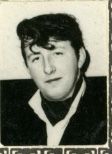Paul McCorry looks back at the night, 50 years ago today, when 21-year-old Billy Halligan was shot dead by the British Army
ON 6 March 2019, the then Secretary of State Karen Bradley stated that the police and British troops did not commit crimes when they killed Irish people, and that it was done in a “dignified and appropriate way”.
The statement came 48 years to the day since my good friend Billy Halligan (21) was targeted and killed by British Army sharpshooters, who were brought to the top of Balaclava Street to indiscriminately shoot a guy in a light-coloured coat and another youth in a blue jumper.
These are appalling comments from the SoS, and will bedamaging to her credibility. Her job is stand up for the rule of law and the independence of the police, PPS and judicial system. An urgent clarification and apology is essential. @NIOgov https://t.co/Ys0Ln6WL0f
— Stephen Farry MP (@StephenFarryMP) March 6, 2019
My wife and I moved into Balaclava Street that day and I had a clear view of soldiers pointing their rifles. Earlier that day shots were fired and a blast bomb exploded with a mighty bang just five or six doors up from us at number 11. The area grew eerily quiet after 11.30 – it seemed as though that was it for the day.
I watched as a sergeant positioned the eight snipers he had requested and suddenly a soldier screamed “fire”. A hail of gunfire poured down Balaclava Street followed by people screaming. I knew someone had been killed.
In the morning, Jim Taggart called to tell me that Billy Halligan had died in the Parachute Regiment’s gunfire, and another young lad I knew suffered a serious head wound.
The sergeant in charge had told the snipers to aim low. Billy and the other lad suffered head wounds but Billy was also shot in the leg, the bullet passing straight through. I often wonder which shot came first – leg or head?
I remember the newspaper headline, “Bomber Shot”. Billy was not a bomber or gunman and was not a member of the IRA.
I remember the newspaper headline, “Bomber Shot”. Billy was not a bomber or gunman and was not a member of the IRA.
Billy lived for his work as a trained machinist, which he did until he had to leave work after being attacked by loyalists on the boat from the Celtic vs Rangers match. The only work Billy could find after that was at building. He simply could not face life on the dole. People were charged following the attack on the boat, but the case was dropped after Billy’s death.
Eight snipers were called to kill a couple of young men for shouting. The firepower used could have demolished the houses facing up Balaclava Street.
The Historical Enquiries Team (HET) report was full of contradictions: The street was in darkness, there was a carpet of fire from petrol bombs.
Billy Halligan was more than 100 yards from the heavily armed Brits and posed no threat to them. The soldiers were outraged at these young Irishmen shouting at them “go home you bastards”. No-one needed to die that night, but the Brits were outraged.
On reading the HET report, the snipers were given carte blanche to do as they pleased.
Those who killed Billy, the 14 in Derry, 11 in Ballymurphy, six in the New Lodge, and little children are old men now. They must surely have sleepless nights and an assortment of old men’s illnesses.
They also have time to remember and relive the crimes they committed.
They can’t hide from the truth.





